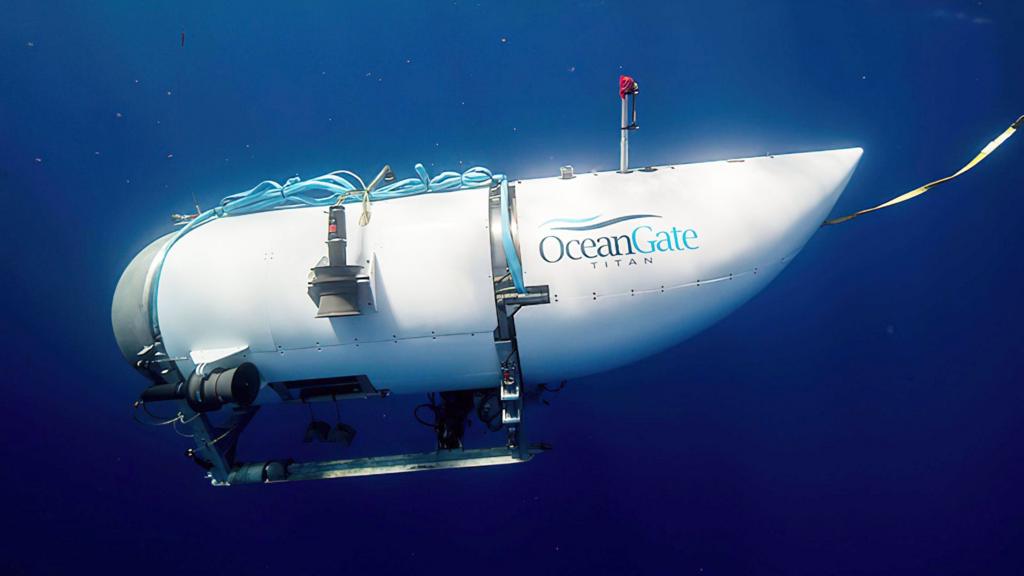Footage from the OceanGate support vessel reveals the precise moment the Titan submersible imploded during its descent to the Titanic wreckage in June 2023, resulting in the death of all five onboard.
The expedition, organized by OceanGate, aimed to explore the Titanic, located 3,800 meters below the surface. Among the passengers were OceanGate CEO Stockton Rush, British explorer Hamish Harding, renowned French diver Paul-Henri Nargeolet, British-Pakistani businessman Shahzada Dawood, and his 19-year-old son Suleman.
The BBC, granted exclusive access to the US Coast Guard (USCG) investigation for its documentary, “Implosion: The Titanic Sub Disaster,” obtained footage showing Wendy Rush, Stockton Rush’s wife, reacting to the implosion’s sound with the question: “What was that bang?”
This video, presented as evidence to the USCG Marine Board of Investigation, underscores the catastrophic failure of the submersible. The investigation also revealed that the Titan’s carbon fiber hull exhibited signs of structural compromise a year prior to the fatal dive.
The footage shows Mrs. Rush, also an OceanGate director, monitoring communications from the Titan. At approximately 3,300 meters, a sound resembling a slamming door is heard. Shortly after, a text message from the submersible indicates the release of ballast weights, leading Mrs. Rush to believe the descent was progressing normally.
The USCG determined that the sound was actually the implosion, occurring before the delayed message reached the surface. The five occupants perished instantly.
Prior to the tragedy, deep-sea experts and former OceanGate employees voiced concerns regarding the Titan’s design, with one describing it as “an abomination” and predicting the disaster’s inevitability. The submersible lacked independent safety certification, raising significant concerns about the hull’s carbon fiber construction.
The USCG investigation pinpoints the onset of hull failure to a dive the previous year (Titan’s 80th dive). Carbon fiber’s unreliability under extreme pressure, and specifically delamination (separation of layers), was cited as a critical factor.
Passengers on a prior dive reported a loud bang, attributed by Mr. Rush to the sub shifting. The USCG analysis, however, indicates this sound was caused by delamination. Lieutenant Commander Katie Williams stated: “Delamination at dive 80 was the beginning of the end… everyone that stepped onboard the Titan after dive 80 was risking their life.”
Following three more dives in 2022, the Titan failed on its subsequent deep dive. Oisin Fanning, a passenger on the two preceding dives, expressed that, knowing what he now knows, he would not have participated. Deep-sea explorer Victor Vescovo echoed concerns, likening the Titan’s voyages to “playing Russian roulette.”
The implosion’s wreckage was recovered from the Atlantic seabed, including personal belongings. The USCG will release a comprehensive report later this year, aiming to prevent future tragedies. Christine Dawood, who lost her husband and son, expressed the profound and lasting impact of the event.
OceanGate offered condolences and stated its full cooperation with investigations. Private lawsuits are underway, and criminal proceedings may follow.
You can watch Implosion: The Titanic Sub Disaster at 9pm on Tuesday, 27 May on BBC Two. It will also be available on BBC iPlayer.
Sign up for our daily newsletter here.
RRS James Cook embarks to study the Porcupine Abyssal Plain, monitoring life at depths of 5,000m.
The violin was used to play hymn Nearer My God To Thee as the ship sank in the Oscar-winning film.
Colonel Archibald Gracie’s letter from onboard the ill-fated ocean liner has been described as “prophetic”.
Colonel Gracie wrote he would wait until the ship’s voyage ended before he would “pass judgement”.
The timepiece was found among the belongings of Danish passenger who died in the 1912 disaster.

